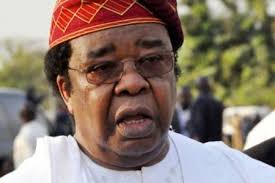Former Minister of Foreign Affairs, Professor Bolaji Akinyemi, kicked against any plan to return the country to parliamentary system of government.
Akinyemi said the claims that Nigeria’s presidential system was prohibitively expensive were untrue. He said it was those voted into power that made the presidential system costly. He lamented the state of local governments in the country, saying the state governments have almost killed the local councils.
The former minister made the remarks in his keynote address at the Songs of Nigeria Festival (SONIFES) awards ceremony in Abuja on Tuesday night.
He said having federalism in Nigeria was not something to be afraid of or apologetic about, adding that it is sheer laziness for Nigeria to be talking about copying what is done in America when it may not suit the country.
A bill seeking to return the country to the parliamentary system of government passed First Reading in the House of Representatives in February.
However, Akinyemi said if the salaries and allowances of the executive and National Assembly were cut by one third, it would be clear to all that the presidential system was not as expensive as politicians had made it.
He stated, “We also must not confuse structure with human personalities. We talk about the presidential system being so costly that we cannot afford it and, therefore, we must go back to parliamentary system. Seriously? Are we really serious about that?
“Is it the presidential system that determines the salaries of our National Assembly members? No! It is the human beings who are operating the system and who decide to make the presidential system costly.
“It is the people who we voted into power, who decide exactly how much they are paid, who decide how much their allowances are.
“If we decide to cut the salaries and allowances of the executive and National Assembly by one third, we will find out that the presidential system is not as expensive as we have made it.
“It is just sheer laziness. We run away from the problem and then with an attempt to decide for the people, we come up with solutions and that solution is going to be put together by human beings who will decide what the salaries of the prime minister and parliamentarians will be.”
The former minister lamented that the state governments had “almost killed” the local governments.
He stated that the state governments were financially stifling and undermining local government authorities in clear contravention of democratic principles of governance.
Akinyemi said, “If we agree to be fair and truthful, the state governments have almost killed or if they haven’t even killed local government establishments.
“I don’t want to get into the debate as to whether it is the business of the state or what it does with the local government within the concept of true federalism that the federal government has no business with local governments. Let’s leave that alone for now.
“But the local governments that are under the states, financially, have suffered considerably. Not enough money has been given to them. The money voted for them by the federal government, the state has found a way around this money not getting to the local government. This is what has led the AGF to take the states to court.”
Akinyemi pointed out that the solution to a problem had to be found in the assessment of the problem, saying, “Not for us to go into a debate as to whether true federalism means we should leave the bolts of the state governors upon the neck of the local government.”
He stressed, “I have argued in several places that there is nothing called true federalism. If you look at the federalism that is practised in Australia compared with the federalism practised in Brazil, with that of Canada and compare it with quasi-federalism practice in Britain and United States, you will find out some issues, which are common to these federal structures, there are massive differences in the federalism that is being practised in this country. So when we talk about true federalism, which one is Nigeria supposed to pursue?
“Therefore, we must make it clear in our minds what kind of federalism we need to practise. We must seriously tackle the issue and then we can have Nigerian federalism.
“To have Nigerian federalism is not something that we should be afraid of or apologetic about. It is sheer laziness for us to be talking about copying what is done in America, when it may not suit us.”
Earlier, SONIFES ’24 President, Dr. Elizabeth Ben-Iheanacho, hailed the silver anniversary as a milestone worth celebrating to mark Nigeria’s democratic journey through its rich cultural traditions.
Ben-Iheanacho stated, “Our songs, festivals, music, films, theatre, dances and traditional institutions have been the bulwark of making democracy in Nigeria the collective experience of the people.”
source: Thisdaylive



